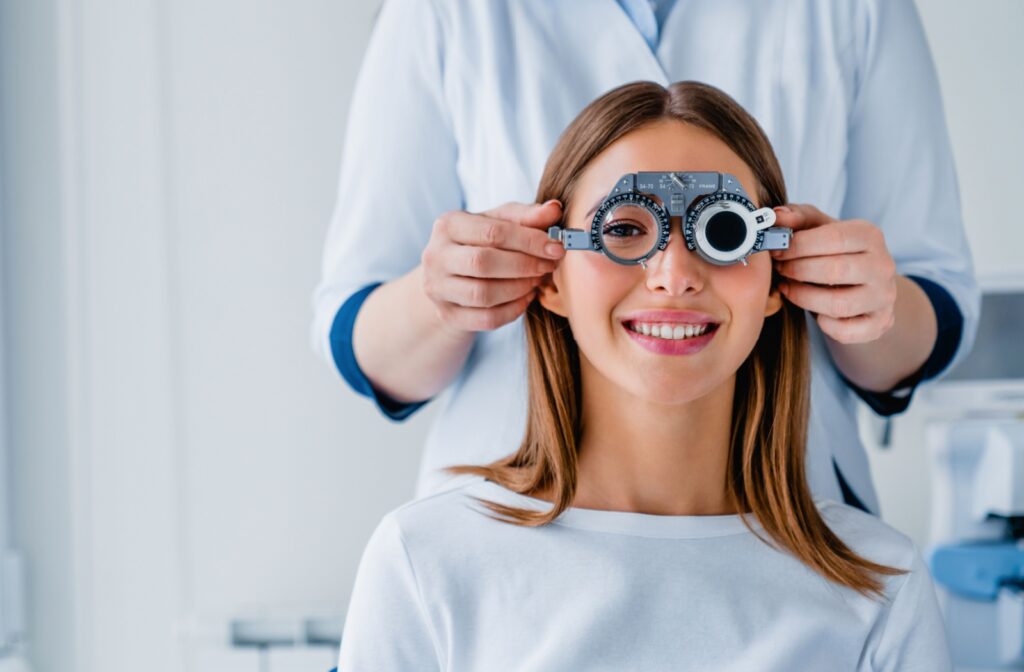Scheduling an eye exam might not be on the top of your to-do list, but it plays a crucial role in maintaining not just your vision but your overall health. Whether you’re balancing work commitments or managing your child’s eye care, understanding what to expect and how long an eye exam will take can make the process a lot less intimidating.
A standard eye exam typically lasts 20-30 minutes, depending on your specific needs and the type of exam. Here’s everything you need to know about the eye exam process and why it’s essential for your overall health.
What to Expect During Your Eye Exam
An eye exam isn’t just about checking if you need glasses or contacts—it’s a look at your overall eye health. Think of it as an annual check-up for your eyes. Your optometrist will evaluate your vision and check for early signs of conditions like cataracts, macular degeneration, and glaucoma, as well as detect any general health issues that could affect your eyes, like diabetes.
How Long Will My Eye Exam Take?
On average, a comprehensive eye exam takes about 20 to 30 minutes. The exact duration depends on your specific needs and whether any additional tests are required. Here’s a general idea:
- For Children & Preteens: A more detailed evaluation may be needed as their eyesight is still developing, so exams may take a little longer.
- For Adults: Typically, exams last about 20 to 30 minutes, but if you wear corrective lenses or have existing eye conditions, additional time may be necessary.
- For Seniors (65+): Older adults often require longer exams to monitor age-related changes or eye diseases.
Regular eye exams are crucial for early detection and treatment, which helps in preserving your vision for years to come.
How Often Should I Schedule an Eye Exam?
How often you need an eye exam depends on your age and individual health needs:
- Children (0–19 years): Should have at least one exam within the first 6 months, another between ages 2–5, and annual exams during school years.
- Adults (20–64 years): Should have a comprehensive eye exam every 2 years unless you wear glasses/contacts or have conditions that require more frequent check-ups.
- Seniors (65+ years): Should have an annual eye exam to stay on top of age-related changes and conditions.
Contact Lens Exams: More Than Just a Prescription
For those who wear or are considering contact lenses, a standard eye exam isn’t enough. A contact lens exam is tailored to ensure that your lenses fit comfortably and safely, as improper fitting can lead to irritation or complications.
A contact lens exam involves several steps:
- Precise Measurements: Using advanced technology, we take detailed measurements of your eyes to find the best fit for your contact lenses.
- Lens Fitting: Your optometrist will provide trial lenses, allowing you to try them on to ensure they’re the right fit for your eyes.
- Education: For first-time wearers, we offer training on how to insert, remove, and care for your contact lenses properly.
Contact lens exams typically take about 25 to 35 minutes, depending on whether you’re a first-time wearer. The extra time ensures a comfortable and safe lens fitting process.

Why Diabetic Eye Exams Are Essential
If you have diabetes, it’s important to understand how it can affect your eye health. Diabetes can lead to complications such as diabetic retinopathy, macular edema, cataracts, and even glaucoma, which is why routine diabetic eye exams are crucial for early detection and treatment.
A diabetic eye exam includes:
- Dilated Eye Exam: Special drops are used to widen your pupils, allowing your optometrist to inspect the health of your retina and optic nerve.
- Imaging Tests: Advanced technologies like optical coherence tomography (OCT) and fundus photography are used to capture high-resolution images of your eye, providing a clearer picture of your eye health.
A diabetic eye exam typically takes around 45 minutes, including time for the dilation drops to take effect. Although it takes a little longer, the information gathered is essential for managing your eye health and preventing vision loss.
The Importance of Glaucoma Testing
Glaucoma is a serious eye condition that can lead to irreversible blindness if left untreated. It often develops without noticeable symptoms, which is why early detection is vital. Glaucoma usually affects peripheral (side) vision first, and the most effective way to detect it is through regular eye exams.
During a glaucoma screening, your optometrist may use:
- Visual Field Tests: To check for any blind spots or changes in your peripheral vision.
- Tonometry: To measure the pressure inside your eye, which can indicate glaucoma.
- OCT Scans: To evaluate the health of your optic nerve, which is often affected by glaucoma.
Prioritize Your Eye Health in Vancouver, WA Today!
We understand that your time is precious, and at Precision Eye Care, we aim to make your visit as efficient and comfortable as possible. Our experienced team is dedicated to providing you with the best possible care, ensuring that your eye exams are tailored to your unique needs.
Whether you’re coming in for a routine check-up or specialized care, we are here to help you maintain healthy vision for years to come. Reach out to Precision Eye Care in Vancouver, WA today and schedule your eye exam today!





